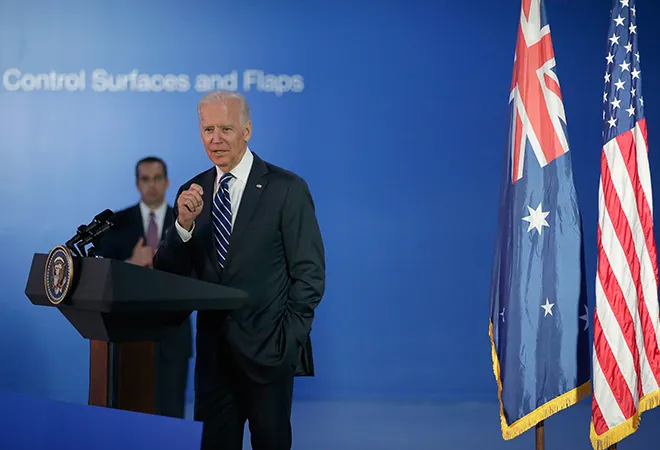
Foreign policy, in general, might take a backseat for some time in the Biden administration’s priority list. The main concern will be “dealing with the coronavirus, rebuilding the economy, and addressing the rifts in American society.” Given that Australia is an important security ally of Washington, its relevance and place in the foreign and strategic thinking of the US will always be intact. But according to Australian analysts, “thinking deeply about Australia and the alliance will be well down the new president’s to-do list. But we will not be invisible to the new administration.” Furthermore, analysts point out, “Australia remains an embedded part of the Washington firm even when the firm is little more than a careening bus — the Trump period has reinforced that truism — and we sit squarely in the hot zone of 21st-century geopolitical tensions.” China will continue to be a central strategic and economic competitor. The policy mechanism of the Obama-era of strategic rebalancing, emphasising close ties with regional allies like Australia, will continue.
It is being said, that there will not be a marked change in the Indo-Pacific strategy, in which case Australia will continue to remain an important cog in this strategy. Australia will be able to provide some substantive insights for the new administration on how to engage constructively within the Indo-Pacific region.
With the Indo-Pacific construct gaining a lot of traction in the recent years, and with the growing visibility of the fault lines in multilateral bodies, there has been a proliferation of minilateral and plurilateral initiatives like the Quadrilateral (QUAD). During his campaign, Biden had stressed on the revamping of multilateral platforms and engagements. Therefore, the future of such platforms like the Quad, where Australia is an important partner and which has only recently been elevated to the ministerial level, remains to be seen. Many analysts in Australia believe that “Biden would be more adept than Trump at sewing together regional coalitions which can, hopefully, help preserve peace in Asia.” A less impulsive foreign policy and a return to normalcy with the win of Biden has brought a sigh of relief for Australia, according to reports by ABC News.
The Trump administration’s ‘callous attitude’ towards multilateralism and global institutions had unnerved Australia. Therefore, restoring America’s place in multilateral forums like the Paris Accord will be welcomed and appreciated by Australia and the island countries in the South Pacific. Biden has made it clear that climate policy will be a top priority, promising to cut carbon emissions. For the Pacific island nations, climate change is a very real threat, and they have “spent years castigating successive Australian governments and also other countries on climate policy.” So far, Australia has brushed off international demands on climate change. If the US tightens the string on climate policy, then most of the other countries will also be compelled to follow its lead. There are possibilities of US-Australia collaboration on furthering technological advancements for reducing emissions.
In general, most in Canberra applauded Biden’s victory and as Michael Fullilove, Executive Director of the Lowy Institute, has stated, “Australia’s interests are served when the United States is well-governed, cohesive, attractive to the world, and strong enough to deter bad behaviour by adversaries.”
The views expressed above belong to the author(s). ORF research and analyses now available on Telegram! Click here to access our curated content — blogs, longforms and interviews.




 PREV
PREV


